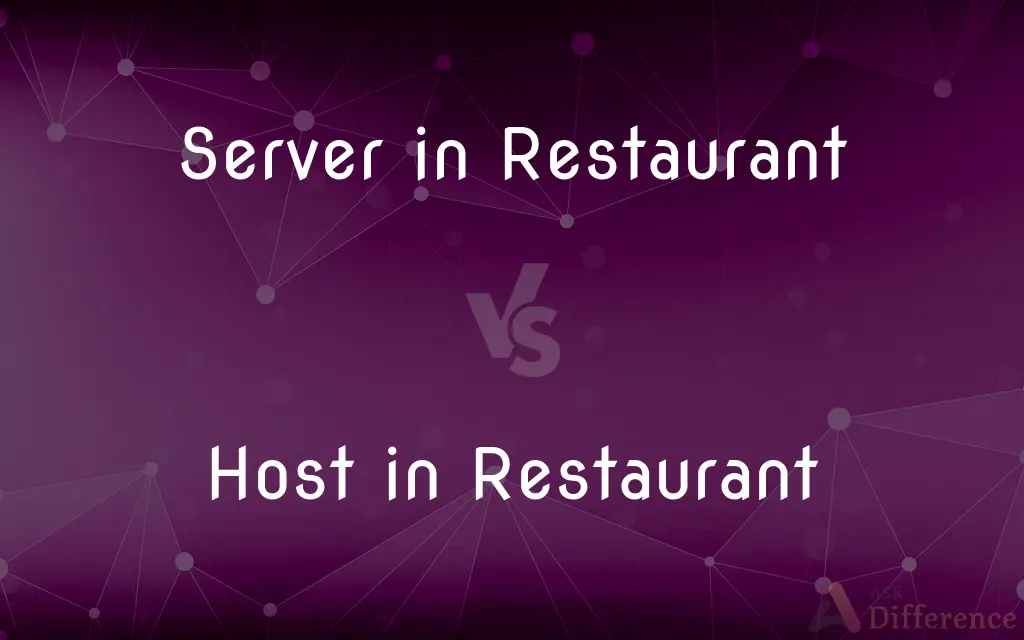Server in Restaurant vs. Host in Restaurant — What's the Difference?
Edited by Tayyaba Rehman — By Fiza Rafique — Published on November 15, 2023
Server attends to dining guests’ needs; takes orders, delivers food. Host manages guest seating, reservations, and initial greetings.

Difference Between Server in Restaurant and Host in Restaurant
Table of Contents
ADVERTISEMENT
Key Differences
In restaurants, a Server primarily focuses on taking orders, serving food, and ensuring customer satisfaction by addressing their dining needs. The role involves direct interaction with customers to provide them with an excellent dining experience. Contrarily, a Host typically doesn't serve food but plays a vital role in creating first impressions, managing reservations, and strategically seating guests to ensure a smooth operation in the dining area.
While the Server spends most of their time interacting with guests at their tables, ensuring their culinary and beverage needs are met, the Host is stationed at the entrance, becoming the first point of contact, welcoming patrons, and generating a warm, welcoming atmosphere. Both roles, Server and Host, are crucial in delivering a seamless customer service experience, but they function in distinctly different spheres of the restaurant operation.
The Server in a restaurant not only serves meals but is also responsible for preparing the bill, processing payments, and sometimes, ensuring tables are clean and organized for the next patrons. Meanwhile, the Host manages the flow of the restaurant by keeping track of available tables, waiting times, and coordinating with the service staff to understand table turnover times and any special arrangements needed.
A crucial difference between a Server and a Host in a restaurant environment lies in their specific skill sets and daily duties. The Server is usually well-versed in menu offerings, preparation methods, and is skilled in upselling items, while the Host needs to excel in customer service, keeping a calm demeanor during peak hours, and efficiently managing a waiting list, if applicable.
Servers are primarily evaluated on their ability to ensure customers are satisfied with their meals and overall dining experience, which directly impacts their tips and, indirectly, the restaurant’s reputation. Hosts, on the other hand, need to balance customer expectations, waiting times, and efficiently manage the dining room’s seating to optimize the use of available tables and maintain a smooth operation throughout the service period.
ADVERTISEMENT
Comparison Chart
Primary Duty
Serves food and attends to guests' needs at tables.
Greets guests, manages reservations, and oversees seating.
Interaction Level
High – directly interacts with guests during meals.
Medium – welcomes guests and interacts at the beginning.
Tip Receiving
Yes – receives tips based on service quality.
Rarely – typically does not receive tips directly from guests.
Requirement of Knowledge
Needs in-depth knowledge of the menu and dish preparation.
Needs knowledge of table arrangement and reservation system.
Work Area
Primarily moves around the dining area.
Primarily stationed at the entrance or the host stand.
Compare with Definitions
Server in Restaurant
The Server handles payment transactions at the conclusion of the meal.
The Server in the restaurant promptly processed our credit card, ensuring a smooth checkout.
Host in Restaurant
Hosts provide waiting guests with estimated wait times and updates.
The Host in the restaurant kept us informed about the wait time for our table.
Server in Restaurant
Servers often engage in friendly interactions to enhance the dining experience.
The Server in the restaurant kindly asked about our day, adding a personal touch to our meal.
Host in Restaurant
The Host manages and organizes seating arrangements and reservations.
The Host in the restaurant efficiently found our reservation and guided us to our table.
Server in Restaurant
Servers may also assist in basic cleaning and setting of their tables.
The Server in the restaurant ensured our table was clean and neatly set before we sat down.
Host in Restaurant
Hosts may address initial inquiries and provide basic information to guests.
The Host in the restaurant provided details about the daily specials and happy hour timings.
Server in Restaurant
A Server ensures customers' orders are taken and delivered accurately.
Our Server in the restaurant ensured our meals were delivered promptly.
Host in Restaurant
A Host warmly welcomes guests upon their arrival to the restaurant.
The Host in the restaurant greeted us with a cheerful smile and kind words.
Server in Restaurant
Servers are responsible for providing meal recommendations and additional items.
The Server in the restaurant recommended a delightful wine pairing with our entrees.
Host in Restaurant
A Host coordinates with servers to manage guest flow and table availability.
The Host in the restaurant communicated with servers to optimize seating during peak hours.
Common Curiosities
What is the main duty of a Server in a restaurant?
The main duty is to take orders, serve food, and ensure the satisfaction of guests during their meal.
Is the Host responsible for serving meals to guests?
No, the Host does not serve meals; that is the primary responsibility of the Server.
What is a Host's role in the dining experience?
The Host manages guest arrival, seating, reservations, and the overall organization of the front-of-house.
Do Servers need to have detailed knowledge of the menu?
Yes, Servers need to understand the menu to answer questions, make recommendations, and manage dietary requests.
Are Servers responsible for greeting and seating guests?
No, greeting and seating guests is typically the role of the Host.
Can a Server also act as a Host in a restaurant?
Typically, no – they have distinct roles, but in smaller establishments, a Server might take on hosting duties.
Is a Host responsible for knowing menu details?
Not as intimately as Servers, but basic knowledge about specials or menu highlights is beneficial for guest inquiries.
What skill is paramount for a Host in a restaurant?
Strong organizational and interpersonal skills are vital to manage reservations, wait times, and guest inquiries efficiently.
Is a Host typically tipped like a Server?
Generally, no – Hosts do not receive tips as frequently or directly as Servers do.
Do Servers handle customer complaints about food quality?
Yes, Servers are often the first to address and manage any issues or complaints regarding meal quality.
What is the main difference between a Server and a Host in a restaurant?
The Server primarily deals with taking orders and serving food, while the Host manages greeting, seating, and reservations.
Do Servers directly receive tips from guests?
Yes, Servers usually receive tips directly based on the quality of service provided.
Who should a guest contact to make a reservation?
The Host, as they manage reservations and oversee the seating chart in the restaurant.
Do Hosts engage in serving food or drinks to guests?
Typically, no – the main duties of a Host revolve around greeting, seating, and managing reservations.
Who should a guest approach for menu recommendations?
The Server, as they have in-depth knowledge of menu items and can offer tailored recommendations.
Share Your Discovery

Previous Comparison
Fine Arts vs. Performing Arts
Next Comparison
Ferric vs. Ferrous SulphateAuthor Spotlight
Written by
Fiza RafiqueFiza Rafique is a skilled content writer at AskDifference.com, where she meticulously refines and enhances written pieces. Drawing from her vast editorial expertise, Fiza ensures clarity, accuracy, and precision in every article. Passionate about language, she continually seeks to elevate the quality of content for readers worldwide.
Edited by
Tayyaba RehmanTayyaba Rehman is a distinguished writer, currently serving as a primary contributor to askdifference.com. As a researcher in semantics and etymology, Tayyaba's passion for the complexity of languages and their distinctions has found a perfect home on the platform. Tayyaba delves into the intricacies of language, distinguishing between commonly confused words and phrases, thereby providing clarity for readers worldwide.













































